Related Research Articles
Jerry Leon Wallace was an American country and pop singer. Between 1958 and 1964, Wallace charted nine hits on the Billboard Hot 100, including the No. 8 "Primrose Lane" that was later used as the theme song for the television series The Smith Family. He made his debut on the country music charts in 1965, entering it thirty-five times between then and 1980. In that timespan, Wallace charted within the country Top Ten four times. His only number one song was "If You Leave Me Tonight I'll Cry," a song which gained popularity after it was used in an episode of the 1970s TV series Night Gallery.
Bubbling Under Hot 100 Singles is a chart published weekly by Billboard magazine in the United States. The chart lists the top songs that have not yet charted on the main Billboard Hot 100. Chart rankings are based on radio airplay, sales, and streams. In its initial years, the chart listed 15 positions, but expanded to as many as 36 during the 1960s, particularly during years when over 700 singles made the Billboard Hot 100 chart. From 1974 to 1985, the chart consisted of 10 positions; since 1992, the Bubbling Under Hot 100 Singles chart has listed 25 positions.
"Teach Me Tonight" is a popular song that has become a jazz standard. The music was written by Gene De Paul, the lyrics by Sammy Cahn. The song was published in 1953.

"Since I Don't Have You" is a song written and composed by Jackie Taylor, James Beaumont, Janet Vogel, Joseph Rock, Joe Verscharen, Lennie Martin, and Wally Lester. It was first a 1958 hit single for the doo-wop group the Skyliners on the Billboard Hot 100. Country music singer Ronnie Milsap had a hit with the song in 1991. American hard rock band Guns N' Roses also had some success in 1994 with their version of the song which reached the top 10 on the UK Singles Chart.

"Chain Gang" is a song by the American singer-songwriter Sam Cooke, released on July 26, 1960.
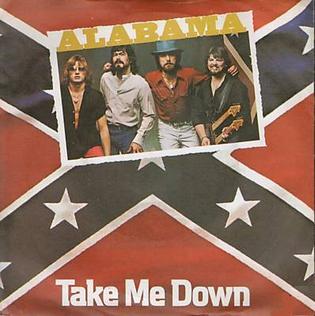
"Take Me Down" is a song recorded by American country music band Alabama. It was released in May 1982 as the second single from Alabama's album Mountain Music.
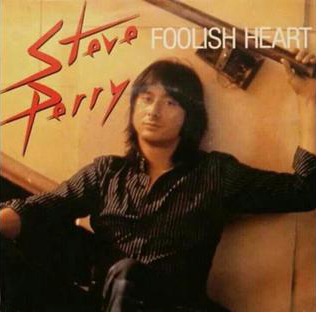
"Foolish Heart" is a song written by Steve Perry and Randy Goodrum, and was performed by Perry from his first solo album, Street Talk. It was released as the fourth single from the album in November 1984 and peaked at number 18 on the Billboard Hot 100 and number two on the Adult Contemporary chart in February 1985.
"City Lights" is an American country music song written by Bill Anderson on August 27, 1957. He recorded it on a small Texas label called TNT Records in early 1958 to little acclaim. The song was first cut by Anderson in 1957 at the campus of the University of Georgia. In June 1958, Ray Price recorded it and his version hit number 1 on the Billboard Hot Country Songs singles chart in August 1958. Mickey Gilley's version also hit number 1 in June 1975.
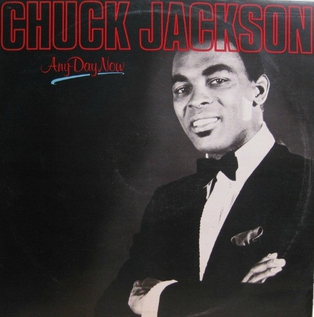
"Any Day Now" is a popular song written by Burt Bacharach and Bob Hilliard in 1962. It has been recorded by numerous artists over the years, including notable versions by Chuck Jackson in 1962, Alan Price in 1965, Elvis Presley in 1969, Scott Walker in 1973 and Ronnie Milsap in 1982. In the lyrics, the singer predicts the imminent demise of a romantic relationship and describes the sadness this will leave.
"A Lover's Question" is a 1958 Pop, R&B hit for Clyde McPhatter. The single was written by Brook Benton and Jimmy T. Williams and was Clyde McPhatter's most successful Pop and R&B release. The bass singer is Noah Hopkins. "A Lover's Question" made it to #6 on the Billboard Hot 100 and was #1 for one week on the R&B chart.
"Funny How Time Slips Away" is a song written by Willie Nelson and first recorded by country singer Billy Walker. Walker's version was issued as a single by Columbia Records in June 1961 and peaked at number 23 on the Hot C&W Sides chart. The song has been featured in several live action films and television shows, such as in the first episode of the second season of AMC’s Better Call Saul and in the 2020 Netflix drama The Devil All the Time.

You've Got a Friend is the twenty-eighth studio album by American pop singer Andy Williams, released in August 1971 by Columbia Records. The album bears a striking resemblance to the Johnny Mathis album You've Got a Friend released that same month. Besides sharing their name, the two albums are both made up of covers of easy listening hits of the time, with 11 songs each, and the two albums have seven songs in common that are positioned in a similar order.
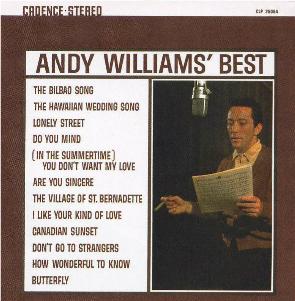
Andy Williams' Best is a compilation album by American pop singer Andy Williams that was released late in 1961 by Cadence Records. This second album to compile the singer's material features 10 songs that made the Billboard Hot 100 along with two of their corresponding B-sides.

Andy Williams' Greatest Hits Vol. 2 is a compilation album by American pop singer Andy Williams that was released in June 1973 by Columbia Records. This collection follows in the footsteps of its predecessor, Andy Williams' Greatest Hits, in that it is not limited to his biggest and most recent hit singles, although his final two US Top 40 entries were included. It also has an album track not released as a single, a couple of hits from his time with Cadence Records, two other singles that could have been included on the first volume, and two Easy Listening chart entries that never made the Billboard Hot 100.

"Never Ending Song of Love" is a song written by Delaney Bramlett, and, according to some sources, by his wife Bonnie Bramlett. It was originally recorded with their band, Delaney & Bonnie & Friends, in 1971 on the album Motel Shot. Released as a single by Atco Records the same year, "Never Ending Song of Love" became Delaney & Bonnie's greatest hit on the pop charts, reaching a peak of No. 13 on the Billboard Hot 100 and No. 8 on Easy Listening. It reached No. 16 in Australia.

"I Guess the Lord Must Be in New York City" is a song written and recorded by singer-songwriter Nilsson in 1969. A track from his fourth studio album, Harry, it became his second charting single.

"Don't Throw It All Away" is a song written by British musician Gary Benson and first released by the Shadows on their 1975 album Specs Appeal. Benson released his version as a single later the same year, which reached number 20 on the UK Singles Chart in the fall of 1975.
"See Ruby Fall" is a song co-written by Johnny Cash and Roy Orbison. The title is a play on the phrase "See Ruby Falls", which is painted on some Southern barn roofs to direct potential tourists to a well-known waterfall in Chattanooga.
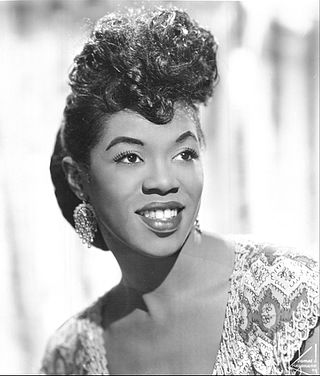
The singles discography of American Jazz artist Sarah Vaughan contains 89 singles, two promotional singles and seven other charted songs. Vaughan recorded her first singles in 1946, with her first release being "If You Could See Me Now". Soon after, she saw her first major chart success on the Billboard pop list with "Tenderly" and "It's Magic." Moving to Columbia Records, she had further pop hits in the late 1940s with covers of "Black Coffee" and "Nature Boy." She had her second top ten hit in 1950 with "(I Love the Girl) I Love the Guy." Vaughan moved to Mercury Records during the 1950s and recorded more pop music. At Mercury, she had her biggest chart success, with the top ten hits "Make Yourself Comfortable" and "Whatever Lola Wants." In 1959, Vaughan's single "Broken Hearted Melody" reached number seven on the Billboard pop chart and became an international success, becoming the biggest single of her career.
References
- ↑ "Billboard Top 100 - 1959". Archived from the original on January 2, 2014. Retrieved April 19, 2014.
- ↑ Whitburn, Joel (2013). Joel Whitburn's Top Pop Singles, 14th Edition: 1955-2012. Record Research. p. 894.
- ↑ Whitburn, Joel (2002). Top Adult Contemporary: 1961-2001. Record Research. p. 226.